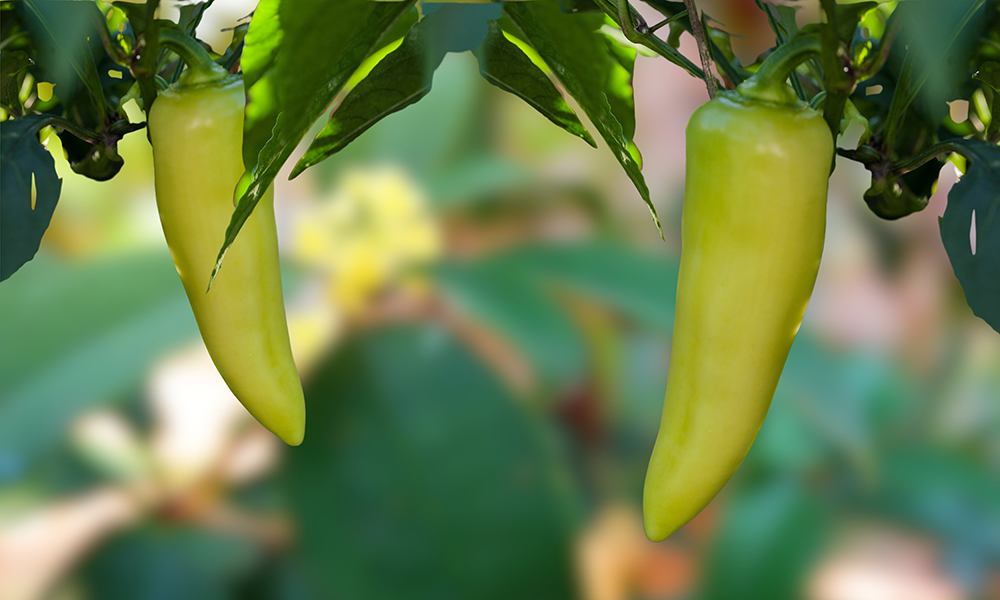Next time grilling season rolls around, you may find yourself throwing some peppers on the grill, but when your dog comes over to give you those puppy dog eyes, you might wonder if they can eat peppers. In some cases, yes, dogs can safely eat peppers (in extreme moderation), but in other cases, it’s unwise to give your canine pal certain peppers. So, where do banana peppers fall on the list of good or bad peppers?
Can dogs have banana peppers? Honestly, there’s some debate about that. Banana peppers contain capsaicin, which isn’t strictly toxic to canines but isn’t good for them as it can cause discomfort and gastrointestinal issues. However, if you stick with the mildest banana peppers, many believe letting your pup have a small piece now and then shouldn’t harm them. So, if your dog sneaks a bite of a mild banana pepper, they should be fine, but if you want to go the safest route, avoid giving this food to your pet.


Why Can’t Dogs Eat Banana Peppers?
Banana peppers contain a chemical known as capsaicin, which is responsible for the spicy burn of foods like peppers, and spice and canines tend to not get along. Like humans, different dogs will have varying levels of spice tolerance, but even if a dog has a higher spice tolerance, it doesn’t mean eating something with spice won’t upset their stomach or cause irritation to their mouths.
Plus, your pup is unlikely to enjoy the spicy taste, and just a small amount of capsaicin might cause great discomfort for canines with a severely low spice tolerance. Banana peppers are usually fairly mild but certain varieties and overripe peppers can have a higher concentration of capsaicin. Avoiding giving banana peppers to your dog is your safest bet.


Dangers of Feeding Banana Peppers to Dogs
Here’s a closer look at the potential risks of feeding banana peppers to your pup.
Capsaicin Effects
What sort of discomfort might a canine experience if the capsaicin in a banana pepper proves too much for them? For starters, a dog could end up with gastrointestinal upset, such as stomach pain, diarrhea, and vomiting. Plus, if the capsaicin burns too much, it could make a pup incredibly thirsty; drinking too much water could lead to bloating and more abdominal pain.
Then, there’s the discomfort to the mouth that capsaicin could cause. If a banana pepper ends up being too spicy for your dog, it could irritate the mouth or throat. If your dog gets their paws on something like a banana pepper or something else spicy and eats it, you need to watch them for signs of trouble swallowing or other discomfort. If you see anything like this, your vet should be called.
Sodium Content
This one applies only to pickled banana peppers. Pickling involves brining, which involves a whole lot of salt, so pickled peppers are packed with sodium. Too much sodium isn’t healthy for our canine companions, and can lead to excessive thirst, vomiting, or diarrhea. So, stay far away from banana peppers that have been pickled!
Allergies
Like people, dogs can be allergic to certain foods, but in dogs allergies tend to be to animal proteins such as chicken, beef and dairy. So while this will be a much rarer risk, it’s still possible some dogs might be allergic to banana peppers. The most common signs of food allergies in dogs are gastrointestinal signs like vomiting and diarrhea, and itchy skin signs. If you are concerned your dog may have a food allergy, speak to your vet for advice.


Are There Benefits of Giving Banana Peppers to Dogs?
Like most fruits and veggies, banana peppers offer your dog a few nutritional benefits. However, considering how little of the banana pepper they would be eating, the risk of an adverse reaction due to the capsaicin likely outweighs any benefits.
However, banana peppers do contain Vitamin C. While dogs can make their own Vitamin C and don’t need it in their diet to stay healthy, extra Vitamin C may help support immunity. These peppers also have fiber in the seeds and skins; fiber is necessary to a dog’s diet to help pups feel fuller longer and aids with digestive health. Banana peppers also provide a bit of potassium, an essential electrolyte needed for nerve impulse transmission and muscle contraction. Finally, banana peppers are low in calories, making them healthier in this respect than some other snack options.


Conclusion
The question of whether dogs can have banana peppers is up for debate just a bit. Some people think it’s fine to give banana peppers to a dog as long as you go with the mildest version and only give them a minute amount. But with the capsaicin found in banana peppers, your safest bet is to avoid giving this food to your pup entirely so as not to risk an adverse reaction.
Featured Image Credit: Aeska, Shutterstock
